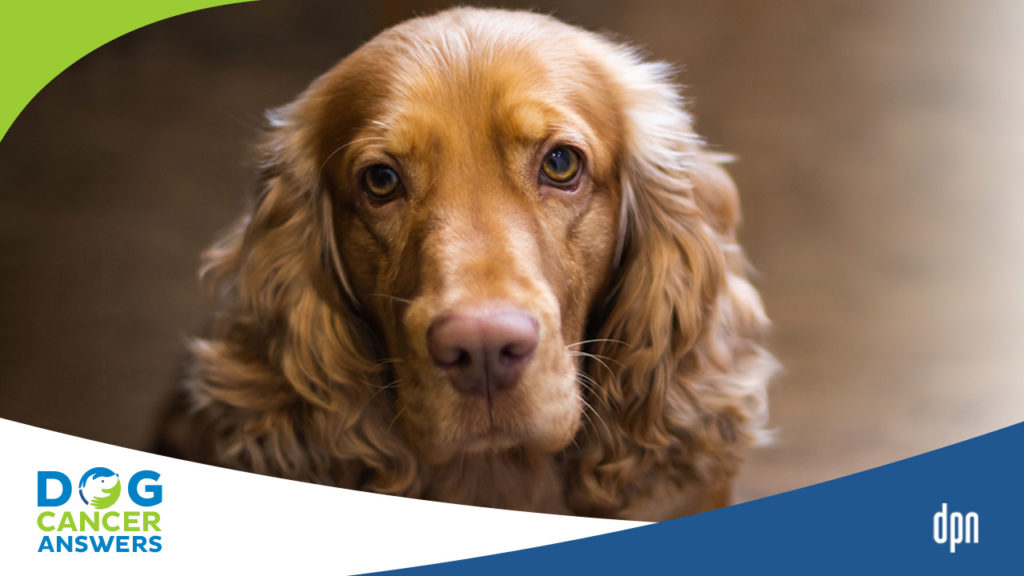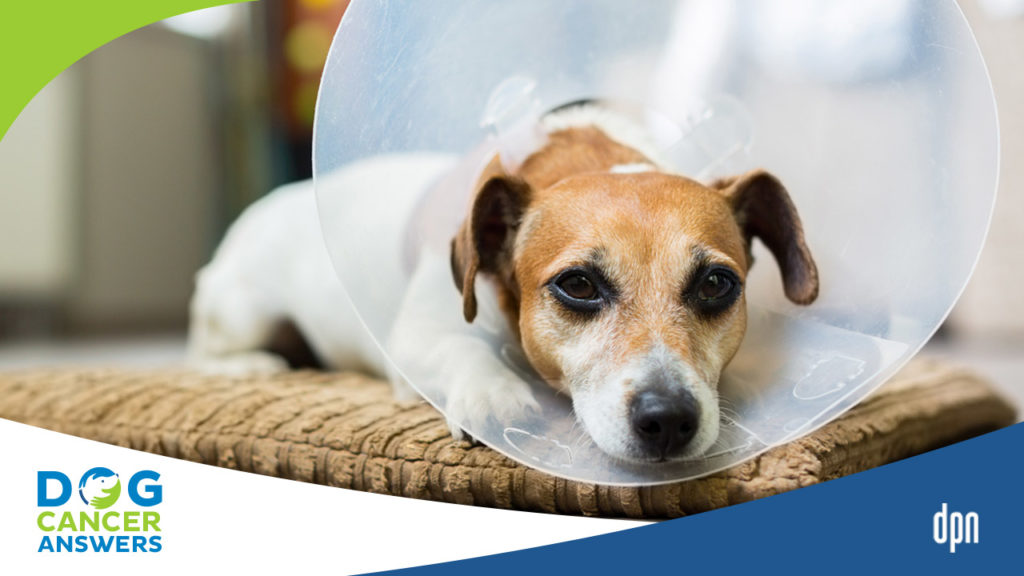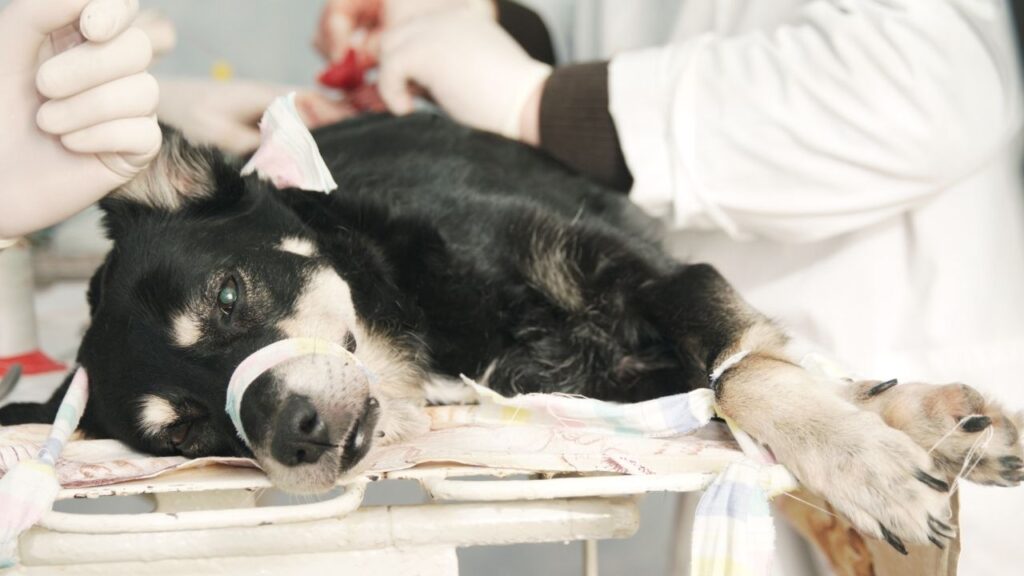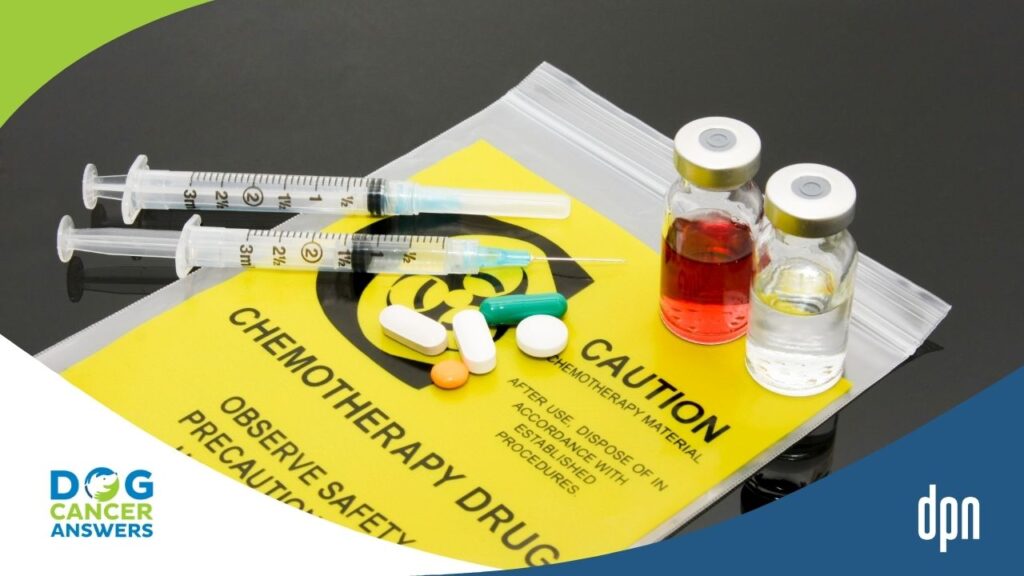EPISODE 128 | RELEASED August 30, 2021
Anal Tumor Surgery In Older Dogs │ Dr. Nancy Reese Q&A
John’s Jack Russell has an anal tumor, and it’s operable. But his girl is 13. Is she too old for surgery? Dr. Nancy outlines the factors to consider.
SHOW NOTES
When is a dog too old for surgery? Dr. Nancy advises John, parent to a 13-year-old Jack Russell Terrier, about whether to go ahead with anal sac cancer surgery for his dog. There are some specific questions she’d ask BEFORE making the decision.
[00:00:00] >> James Jacobson: Today’s show is brought to you by the bestselling book, The Dog Cancer Survival Guide: Full Spectrum Treatments To Optimize Your Dog’s Life Quality and Longevity. It’s available everywhere books are sold in both paperback and digital editions, and on the publisher’s website at DogCancerBook.com. Use coupon code PODCAST on that website to get 10% off The Dog Cancer Survival Guide today.
[00:00:31] >> Dr. Nancy Reese: A 13-year-old Jack Russell is not too old for surgery, but I would definitely like to always have a good talk with the surgeon because sometimes you can recommend something, but not necessarily think there’s a high chance of success.
[00:00:44] >> Announcer: Welcome to Dog Cancer Answers, where we help you help your dog with cancer.
Here’s your host, James Jacobson.
[00:00:52] >> James Jacobson: Hello friend, and thank you for joining us. Today we are taking a call from a listener named John whose Jack Russell Terrier is facing surgery in a rather delicate area. John’s question is this: is his dog too old for surgery, and what about surgical complications? To answer John’s questions, we are joined by our Chief Medical Editor, Dr. Nancy Reese. Dr. Nancy is a veterinarian with a Master’s in Preventative Veterinary Medicine and a PhD in Epidemiology. Dr. Nancy Reese, thank you once again for joining us on Dog Cancer Answers.
[00:01:33] >> Dr. Nancy Reese: It’s nice to be back.
[00:01:34] >> James Jacobson: We are going to take a listener call today, and this comes from John in Philadelphia, who has a question about a dog that has rectal cancer. Let’s listen.
[00:01:45] >> John: Hello. My name is John Beretsky. I’m calling from greater Philadelphia, Pennsylvania. My dog was recently diagnosed with a rectal mass and they’re unable to determine whether or not it is benign or cancerous. The doctor is recommending colon mass resection and anastomosis in order to remove the possibly cancerous tumor, approximately one centimeter by three centimeters.
And, we are concerned because our dog is 13 years old and worried about the recovery time or any sort of additional possible complications due to this surgery. Right now, we’re not sure about the surgery because she is not really experiencing a lot of negative symptoms at this time. She’s still very active and, you know, seems to not be in discomfort.
She’s a very finicky eater. And so this additional surgery could lead to, you know, lack of eating, as well as a number of other concerns that we have. We’ve tried to get a biopsy prior to any sort of invasive surgery. And those biopsies were negative slash inconclusive. The current veterinarian recommending surgery stated that she believes that surgery is the best course of action.
And while they are going to conduct surgery, they’re going to do a biopsy, as well as biopsy the lymph nodes in the general area to determine if there is cancer. They think that might be in the lymph nodes because there is inflammation, but they are unsure without going into, and actually performing surgery. Anyway, I’d love to hear your opinion.
[00:03:36] >> James Jacobson: Dr. Nancy, what are your thoughts for John?
[00:03:38] >> Dr. Nancy Reese: First thing I’d have to say is that, uh, I have to commend John and his veterinarians for finding the rectal tumor, because honestly we don’t do rectal exams in every patient. Partly sometimes it’s the animal’s temperament that won’t allow that or the discomfort that we think it might cause.
So a lot of times these aren’t found, I hate to say it, but until it’s sort of too late to do anything. So it’s a nice sign that they’re actually saying that surgery would be a possibility, because sometimes they are too far progressed to do it. So I have to commend the whole team for that angle of things.
It’s always a brought up concern about the age of an animal and surgery. I always say that age is not itself reason enough to avoid surgery. If all the other health parameters are in good shape, the heart’s good, lungs are good, blood work, X-rays, all of that are good, and there’s no definitive signs of metastasis, then an older dog usually can undergo surgery successfully. Jack Russell’s are pretty hardy dogs. So they certainly have a life expectancy longer than something like a Rottweiler or a Golden Retriever. So that has to be a factor, too. So much depends on the general health of the particular dog, as in, it’s a hard thing to think about, but even with a greatly successful outcome for the surgery, we don’t know what other health issue might pop up in the near future, or in several years. So it really is always a balancing act of can we successfully do this one, but what’s going to happen next? Honestly, I tend to be a little bit more aggressive in recommending surgery, because I know that without the surgery, almost any mass, it’s gonna get bigger and it’s going to start to cause problems.
So surgery is really the only way to ensure that that might not happen. I shouldn’t say ensure, because things can regrow or something like that, but removal of that is the only way to make sure that the discomfort or clinical effects that that mass is having. That’s the only thing that’s going to make it go away.
[00:05:45] >> James Jacobson: He had concerns about the appetite.
[00:05:48] >> Dr. Nancy Reese: I think it’s been a dramatic improvement in the last several years of veterinary medicine is that we really have pretty good anti-nausea medications as well as appetite stimulants. And I think sometimes that has been a game changer in terms of improving quality of life.
And that’s either with surgery or without. If an animal isn’t feeling good for some other reason that makes them not want to eat, oftentimes returning the appetite can do tremendous things for their general wellbeing.
[00:06:19] >> James Jacobson: We have a show just on appetite stimulants, and
[00:06:23] >> Dr. Nancy Reese: Oh, perfect
[00:06:23] >> James Jacobson: We will put a link to that show in the show notes, so that anyone can learn a little bit more about it because some of those drugs are pretty extraordinary.
Any other advice for John?
[00:06:34] >> Dr. Nancy Reese: I guess when you’re considering a surgery, the two benefits that happen. One is that you can actually find out what it is, ’cause they can put the mass in, find out exactly what type of growth it is, and that might give more treatment options. So diagnosis is a huge thing. And if the thing ends up being completely removed, you might actually have some type of cure.
The downside always is unexpected complications, a surgery like that is certainly not a surgery I would do. I would call a surgeon in to do that, because that is definitely not my area of expertise. But you can have what’s called dehiscence where the stitches and things don’t hold well, and that could lead to a pretty bad infection.
There can be unexpected anesthesia problems, and that can happen in an old dog or a young dog. So there always is that risk and things, but surgery does have a couple of good benefits. I always say, I wish I had a crystal ball because if I knew which ones would do great, then I would recommend it for those and not for the others.
[00:07:33] >> James Jacobson: And so a 13-year-old JRT, not too old for surgery.
[00:07:38] >> Dr. Nancy Reese: I would say yes, a 13-year-old Jack Russell is not too old for surgery, but I would definitely like to always have a good talk with the surgeon, because sometimes you can recommend something, but not necessarily think there’s a high chance of success. So if you can get a chance to talk to the surgeon and say, you know, I’ve done 50 of these and 49 of the dogs have done very well, that’s a good endorsement. If they say, you know, I do 50 of these and only ten do well, that would be a big red flag for not going ahead.
[00:08:07] >> James Jacobson: And that’s probably another reason you want to have a surgeon do it. Someone who has done a lot of these, because they’ll have some batting averages.
[00:08:15] >> Dr. Nancy Reese: Absolutely.
[00:08:16] >> James Jacobson: You know, it’s just better to work with a surgeon who does this day in and day out and that’s all they do.
[00:08:20] >> Dr. Nancy Reese: Right. Yeah. Yes, so some surgeries, every surgery is a little bit complicated, but some surgeries are fairly straight forward. So even for somebody that doesn’t do a lot of them, it’s a, I won’t say it’s like riding a bike, but there’s some things that are very straight forward. Anything involving the intestinal track, it’s just a little more tricky.
[00:08:38] >> James Jacobson: Dr. Nancy, thank you so much. John, I hope that helps. Nancy Reese, thank you for being with us today.
[00:08:44] >> Dr. Nancy Reese: All right, and good luck, John.
[00:08:47] >> James Jacobson: And thank you listener for being here today. If you have a question for one of our veterinarians, just like John did, you can call our Listener Line. The phone number is (808) 868-3200.
That is (808) 868-3200, and you can leave a recording on our 24-hour-a-day Listener Line. Also, please know that we have a lot of resources in our show notes. You can check those show notes in your podcast app, or on our website at DogCancerAnswers.com. Also, please, don’t forget to subscribe to our free newsletter.
It’s called Dog Cancer News, and you can get it at DogCancerNews.com. As I said, this subscription is free, but the priceless information you will receive is extremely useful. It’s filled with news and information and it comes out several times a week. You can sign up at DogCancerNews.com and you can unsubscribe at any point.
And please, also don’t forget to join our Facebook support group that you can find at DogCancerSupport.com. It’s a powerful community, and you should be a part of it if you are facing cancer for your dog. Well, that is it for today’s show. I want to thank you for downloading the show and hitting the play button.
If it was helpful, please consider telling a friend about this podcast and about Dog Podcast Network in general, where we have a full slate of shows, especially for dog lovers. From all of us here at Dog Podcast Network, I’m James Jacobson wishing you and your dog a very warm aloha.
[00:10:29] >> Announcer: Thank you for listening to Dog Cancer Answers. If you’d like to connect, please visit our website at DogCancerAnswers.com or call our Listener Line at (808) 868-3200. And here’s a friendly reminder that you probably already know: this podcast is provided for informational and educational purposes only.
It’s not meant to take the place of the advice you receive from your dog’s veterinarian. Only veterinarians who examine your dog can give you veterinary advice or diagnose your dog’s medical condition. Your reliance on the information you hear on this podcast is solely at your own risk. If your dog has a specific health problem, contact your veterinarian.
Also, please keep in mind that veterinary information can change rapidly. Therefore, some information may be out of date. Dog Cancer Answers is a presentation of Maui Media in association with Dog Podcast Network.
Hosted By
SUBSCRIBE ON YOUR FAVORITE PLATFORM
Topics
Editor's Picks
CATEGORY











